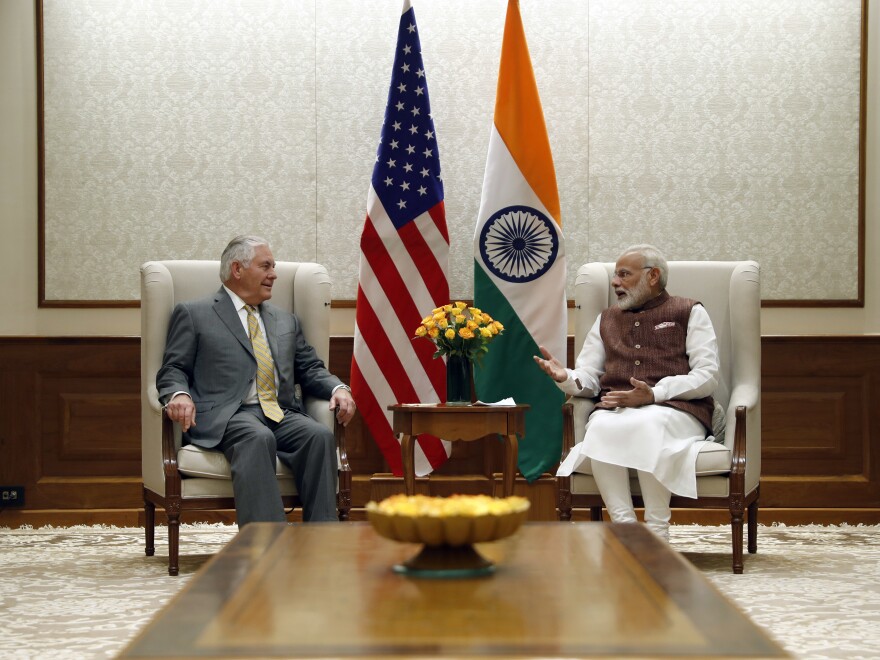As China's clout in the Asia-Pacific region rises, the United States is wooing India into a closer embrace.Standing beside Indian External Affairs Minister Sushma Swaraj during his maiden visit to South Asia as secretary of state this week, Rex Tillerson saidthe United States "supports India's emergence as a leading power."Washington envisions India firmly anchored in U.S. strategy for a peaceful, stable Afghanistan, helping to strengthen Afghan capacities and institutions.And further east, the U.S. wants India to partner with Japan and Australia as a hedge against Chinese aggression. Across the region, countries watch nervously as Beijing asserts territorial claims in the South China Sea.The U.S. also wants India working with it to build road and port connectivity in what the Trump administration calls the Indo-Pacific region, as a sort of alternative to China's ambitious One Belt One Road initiative, which aims to stimulate economic growth across Asia and beyond, building massive amounts of infrastructure that connect China to countries around the globe.Tillerson's remarks that too many terror groups in Pakistan found "safe havens" to launch attacks on others generated the most headlines in the decidedly anti-Pakistan Indian press.But the Hindustan Times said the big takeaway of Tillerson's engagement was that "the two biggest democracies in the world should join hands in providing a rule based and transparent funding alternative" to the One Belt One Road initiative.In a policy speech last week, Tillerson said the U.S. should collaborate with India to ensure a region "of peace, stability, and growing prosperity — so that it does not become a region of disorder, conflict and predatory economics."Only a few months ago, India was the odd man out in opposing the estimated trillion-dollar Chinese projectthat held other nations in thrall. New Delhi said Beijing's project failed international norms for infrastructure development and transparency, and risked unsustainable debt burden.Raja Mohan of Carnegie India says New Delhi's "stinging rebuke" of China's initiative has since found favor, however.Even before the Chinese initiative, Neelam Deo, director of New Delhi's Gateway House, says China loaned Sri Lanka money for a major port, among other ventures. With Colombo unable to pay even the interest on the loan, it became "a totally unviable project," she says.Deo calls such lending "a new colonialism" and warns it could happen to many other small economies.Carnegie's Mohan points out that Tokyo has earmarked $200 billion over the next five years to improve connectivity in countries around world with "better terms for assistance," and says with U.S. and Japanese partners, India will now be in a position "to offer a credible alternative."Samir Saran of theObserver Research Foundation, a New Delhi-based think tank, says though it is not necessarily "India-directed," what China is essentially trying to do is "to write the rules for the Asian century."It wants, Saran says, "to connect Asia through its infrastructure, it wants to finance Asia ... and create its own trading arrangements." Eventually, he says, it wants "to erase all sub-regions" like the Indian subcontinent.Saran says the U.S.-India relationship needs to move beyond bilateral trade and defense tie-ups.Unless the two countries can work together in building up the region, "helping countries meet their infrastructure needs," strengthening democracies, and meeting economic aspirations, Saran says, "The Chinese will always be setting the pace."Tillerson's trip coincided with the Chinese Communist Party Congress, where President Xi Jinping consolidated his power to a degree not seen since the era of Mao Zedong.An editorial in India's Telegraph newspaper said, "It is now clear that a new chapter of the Great Game is unfolding." At the Communist Party Congress this week, the paper noted, Xi said Beijing did not seek global hegemony, but "no one should expect China to swallow anything that undermines its interests."Nor should India, cautions the Telegraph editorial. As it forms tighter bonds with the United States, the newspaper warned India to avoid assuming "the role of an American vassal in this complex tug of war."Many analysts note the huge disparity between India and China in importance for the U.S. U.S.-China trade in goods and services last year amounted to nearly $700 billion. U.S.-India trade paled in comparison, at just under $115 billion.Their conclusion: Predicating a deepening of U.S.-Indian relations on the notion of checking China may not be realistic. Copyright 2017 NPR. To see more, visit http://www.npr.org/.
Tillerson Visit Highlights India's Evolving Relationship With U.S.



